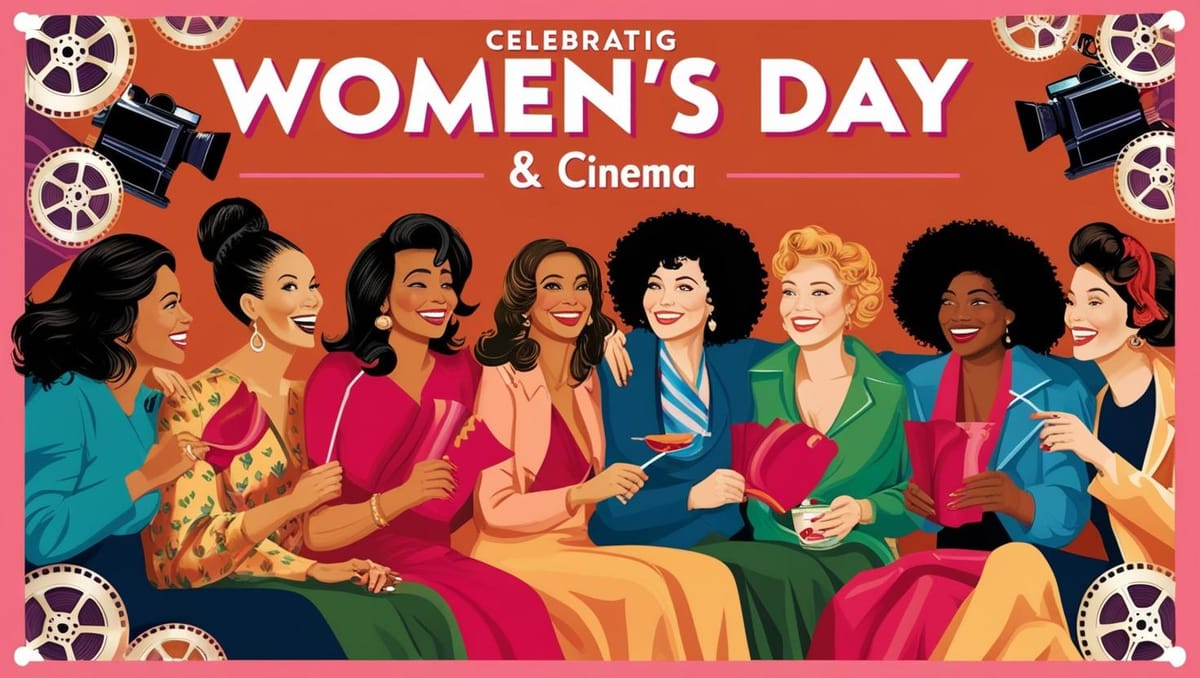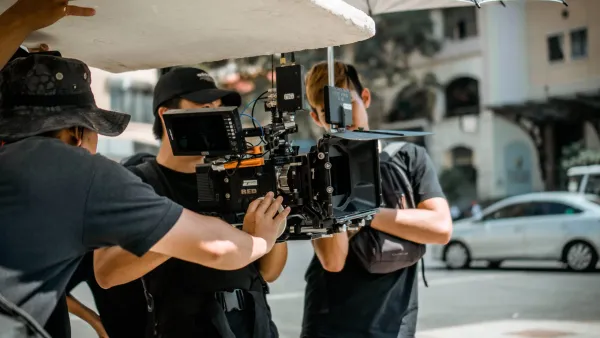International Women's Day and Cinema: The Power, Representation, and Achievements of Women

by Birgül Tombul
International Women's Day is celebrated worldwide every year on March 8 to honor women's social, economic, cultural, and political achievements while creating an environment conducive to solving issues related to gender equality. This special day not only celebrates the challenges and victories women have faced in their fight for gender equality but also aims to stand against gender inequality.
Cinema, as one of the most powerful and comprehensive tools for change, provides a platform where social transformations, individual rights, and societal norms take shape. The relationship between International Women's Day and cinema offers an opportunity to discuss topics such as women's representation in cinema, the evolution of female lead characters, the influence of female directors, gender inequality in the film industry, and the overall role of women in cinema.
For a long period, women in cinema were merely aesthetic figures, often valued for their appearance rather than their talent. Many actresses have shared their experiences in interviews, revealing the pressures they faced to maintain a certain physique. These pressures extended to natural aspects of life, such as pregnancy and breastfeeding, which were often discouraged due to fears of body changes. The extent of these restrictions is shocking and highlights the deep-seated gender biases in the industry.
Moreover, in producer-actor dynamics, women have historically faced greater challenges than their male counterparts. The #MeToo movement revealed the widespread harassment and exploitation women endured, emphasizing that these issues could only be brought to light through mutual support among women in the industry.
The evolution of female lead characters is also fascinating. Until the 1990s, women in films were often portrayed as stabilizing forces within family structures. However, after this period, we began to see female protagonists with their own goals, ambitions, and the ability to shape their own destinies. They transformed into characters capable of driving change for themselves.
Female directors have played a crucial role in bringing gender-related issues and discrimination into the public discourse. The rise of short films has particularly benefited women in the industry, as they provide a cost-effective and accessible medium to highlight pressing social concerns. Unlike feature films, short films require significantly lower budgets and offer a platform for women filmmakers to share their stories, thereby encouraging more women to pursue filmmaking.
The Role of Women in Cinema
Cinema has long been a male-dominated field, where women were often relegated to secondary roles supporting male protagonists. Historically, female characters were frequently portrayed as passive and stereotypical figures. However, today, strong and independent female representations in cinema are more important than ever.
In early Hollywood cinema, female roles were largely confined to traditional archetypes—housewives, mothers, and devoted lovers. However, during the 1960s and 1970s, fueled by social movements, the role of women in cinema began to shift. Inspired by the women's movement, films featuring strong female leads started emerging. By the 1980s and 1990s, female characters gained more autonomy, and movies began focusing on their stories alongside male leads.
Today, the representation of women in cinema is more diverse. Female characters are no longer confined to their familial roles; they are now depicted as powerful and successful figures in politics, business, science, and the arts. However, gender inequality in the film industry remains an ongoing issue.
The portrayal of women in cinema is influenced by societal norms and perceptions of gender. Audiences often perceive unconventional female characters as threatening to male dominance. Conversely, cinema has the power to reshape societal views on women by presenting role models who inspire and empower. Many female characters have influenced real-life women, giving them the courage to make significant changes in their own lives.
Female Lead Characters
The journey of female protagonists in cinema has undergone a significant transformation over the decades. In the 1950s and 1960s, women were primarily cast in romantic films, dramas, or comedies, with their roles being relatively limited.
However, in the 1970s and 1980s, female leads began to break away from traditional gender roles. They were portrayed as independent, courageous characters who could compete on equal footing with men. This was particularly evident in action, thriller, and science fiction films, where women were depicted as physically and mentally strong.
By the late 1980s and 1990s, female protagonists had evolved further, becoming career-driven, politically ambitious, and self-sufficient individuals.
Today, female characters are more varied than ever. They are not only action heroes or dramatic leads but also complex, multi-dimensional figures in diverse genres. Women in leading roles now frequently appear in films across various social themes, further diversifying their presence in cinema.
The Role of Female Directors in Cinema
Historically, female directors have been a minority in the film industry. However, from the late 20th century onwards, significant progress has been made. By the 1990s and 2000s, women directors began to establish a strong presence, challenging the traditional perception of female roles in filmmaking.
Many female directors have used cinema as a medium to explore themes of gender equality, women’s rights, family dynamics, and societal roles. Through their films, they have effectively brought attention to issues stemming from societal perceptions of women.
The growing influence of female directors has enabled more diverse and authentic representations of women in cinema. By making their voices heard, they have enriched the cinematic landscape and introduced new perspectives. Their films contribute not only to the representation of women but also to the broader advocacy of human rights and social justice.
Gender Inequality in Cinema
Gender inequality has been a persistent issue in the film industry. Male directors, producers, and screenwriters have historically dominated the field, limiting opportunities for women in leadership roles. This disparity extends beyond acting, affecting directing, producing, and screenwriting.
Greater support for female filmmakers is essential in addressing societal challenges. As women transform, they also have the potential to transform the world around them. Ignoring this reality would be a significant oversight.
Recommended Films on Women’s Issues
Here are some must-watch films that explore women’s struggles and triumphs:
🎬 Patision Avenue – A gripping drama about a woman balancing career and motherhood, showcasing the struggles of modern women.
🎬 Imperfect – A gender-focused documentary that challenges traditional beauty standards and societal expectations of women.
🎬 Vortex – A psychological thriller that examines the pressures social media places on women and beauty ideals.
🎬 Blocks – A comedy that humorously portrays the everyday struggles of a mother trying to juggle responsibilities.
🎬 Work – A thought-provoking drama addressing issues such as harassment, violence, and inequality faced by women in daily life.
🎬 Please & Thank You – A moving film about the challenges of single motherhood and the impact of financial struggles on women.
Conclusion
International Women's Day serves as a crucial opportunity to celebrate women's achievements, highlight their challenges, and advocate for gender equality. Effort and perseverance are valuable in all areas, regardless of gender. Cinema, as a storytelling medium, plays a vital role in shedding light on these struggles and pushing for solutions.
As seen in the recommended films, women's issues are multifaceted. Globally, problems such as education accessibility, early marriage, migration, and healthcare access continue to affect women disproportionately. Solving these challenges in a male-dominated world can be difficult, which is why solidarity among women is crucial.
The evolving representation of women in cinema, the rise of female lead characters, and the growing influence of female directors all contribute to strengthening women's presence in the industry. Women's successes in cinema are not just personal achievements but steps toward global progress and transformation. The world is changing, and men and women now walk side by side. In this journey, being equal and self-fulfilled as individuals holds great significance for women.
May the future be bright and safe for all of us. And may cinema continue to inspire, empower, and tell the stories that matter. Long live short films, long live cinema!

